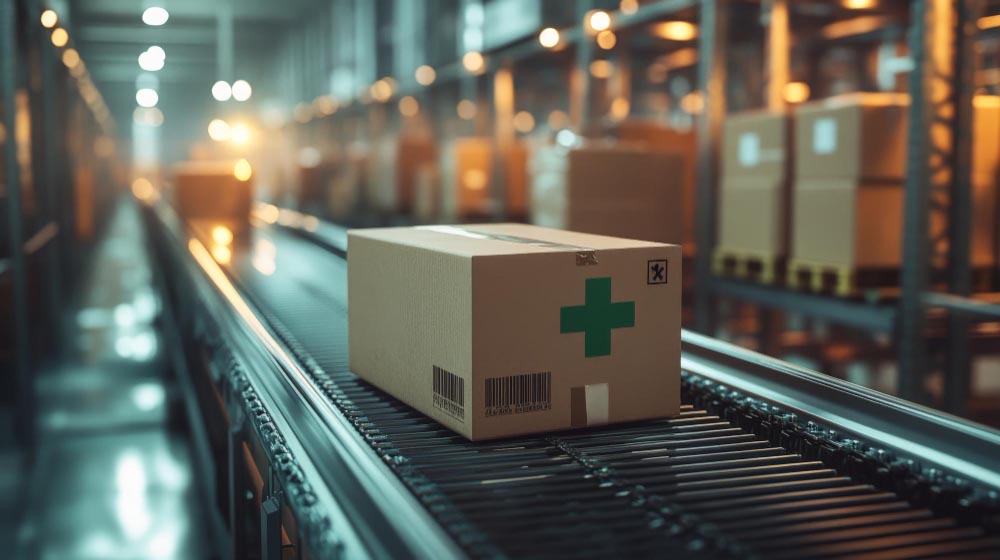
The healthcare sector encompasses critical processes that directly impact human life. Therefore, the storage, transportation, and management of healthcare products require great care. This is where medical logistics plays a vital role in ensuring the sustainability of quality and safe healthcare services. Many products, from medicines to medical devices, must be transported under sensitive conditions.
Medical Logistics and Its Importance
Medical transportation is not merely a shipping activity; it also encompasses ensuring that products are protected under appropriate conditions throughout all stages of the process, from production to the consumer. Healthcare logistics systems must guarantee the safety and effectiveness of products as well as timely and accurate delivery. During the transportation of medical products, various factors must be taken into account, and the highest standards must be maintained at every stage. Whether transporting a small package of medicine or large-scale medical equipment, traceability and transparency are essential throughout the process. For sensitive products in particular, controlling temperature, humidity, and other environmental factors directly affects product quality. Medical logistics is one of the most critical components of the healthcare sector. Transportation under appropriate conditions not only ensures the safe delivery of products but also enhances the effectiveness of healthcare services.
Cold Chain Management
One of the most critical elements in medical logistics is cold chain management. Biotechnological products, vaccines, and certain medications must be transported within specific temperature ranges. Ensuring temperature control during transportation is vital to maintaining the efficacy of these products. Breaking the cold chain can cause products to lose their effectiveness and lead to serious health risks. Such situations can have irreversible consequences for patients. Therefore, advanced cooling systems and temperature tracking devices should be used in drug transportation processes. Vehicles ensure continuous temperature monitoring during product transportation and enable rapid intervention in case of any abnormalities. Cold chain management enhances the efficiency of logistics processes and plays a crucial role in ensuring patient safety. Cold chain management is an indispensable element in medical logistics and must be continuously developed to improve quality and safety in the healthcare sector.
Pharmaceutical and Medical Device Transportation
Drug transportation requires careful planning and execution, as the storage and transportation conditions vary for each drug. Similarly, the transportation of high-cost and sensitive medical devices must also be carried out with great care. Special protection methods are applied during the transportation of devices against external factors such as impact, moisture, and temperature. Appropriate packaging and transportation conditions are important to ensure the effectiveness and safety of the devices. The vehicles and equipment used in the transportation process must also comply with standards. Trained personnel must determine the appropriate transportation methods according to the characteristics and needs of the products being transported.
Pharmaceutical Transportation and GDP-Compliant Processes
Logistics companies that comply with GDP ensure that products are delivered without compromising quality and safety. The GDP rules followed in the pharmaceutical transportation process require the implementation of quality control mechanisms at every stage, such as product traceability, storage, and transportation. Internationally, pharmaceutical transportation and GDP-compliant processes are essential for the sustainability of the healthcare sector and patient safety.
Professional Medical Logistics Service
Professional medical logistics services, provided by specialized companies, ensure the uninterrupted operation of the healthcare sector. They aim to ensure that medical supplies required by healthcare institutions are delivered on time and safely. While patients receive the best service, healthcare workers also have the opportunity to do their jobs more efficiently. Medical logistics services cover storage, packaging, transportation, and delivery processes. Each process is customized according to the needs of the healthcare sector. There are many details that need to be considered, especially when transporting sensitive and critical products. This is where technological infrastructure, digital tracking systems, and professional teams come into play. These elements make medical transportation much safer and more transparent. Professional medical logistics services improve service quality by keeping pace with the dynamic nature of the healthcare sector. Healthcare institutions can quickly access the materials they need through these services, while patient safety is ensured at the highest level.
Frequently Asked Questions (FAQ)
What is the difference between medical logistics and traditional logistics?
Medical logistics requires the transportation of sensitive products under special conditions. However, elements such as cold chain applications, GDP compliance, and product safety constitute the fundamental differences of medical logistics. In traditional logistics, such meticulous conditions are generally not required.
What precautions are taken when transporting medical devices?
When transporting medical devices, special precautions are taken to ensure their safety. First, they are protected with special packaging materials, thereby preventing damage to the devices. Sensors sensitive to external factors such as impact and moisture are used, and these sensors continuously monitor the condition of the devices during transport.
Why does pharmaceutical transportation require specialized expertise?
Pharmaceutical transportation is a process that requires temperature, humidity, and time control to ensure that drugs do not lose their effectiveness. For this reason, standard logistics methods are not sufficient. Specialized expertise is essential for the safe and effective management of this complex process.
What risks does a break in the cold chain pose?
When the cold chain is broken, the effectiveness of medicines and biotechnological products decreases. This situation can lead to treatment failure and have serious effects on patients' health.
You May Be Interested In: What is cold chain transportation?






